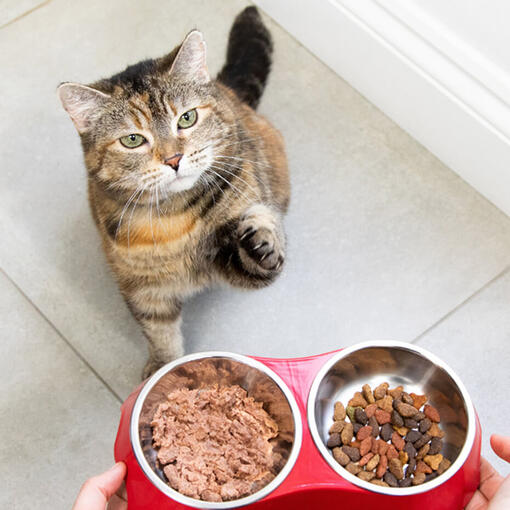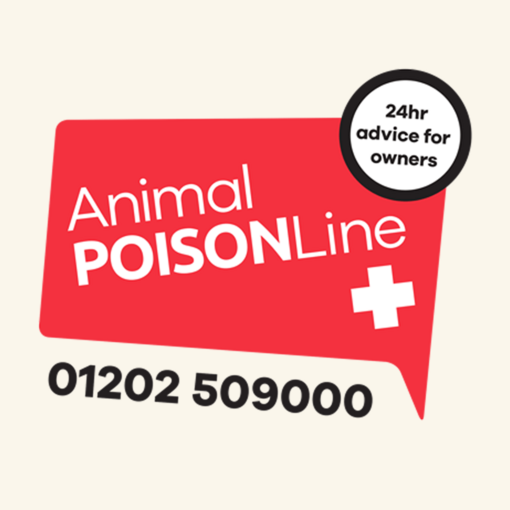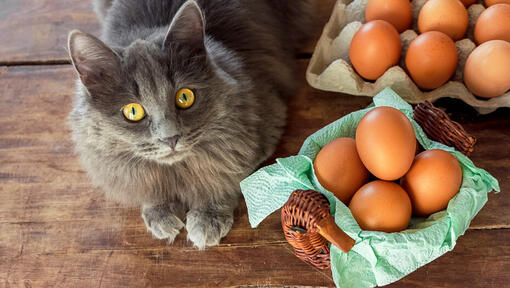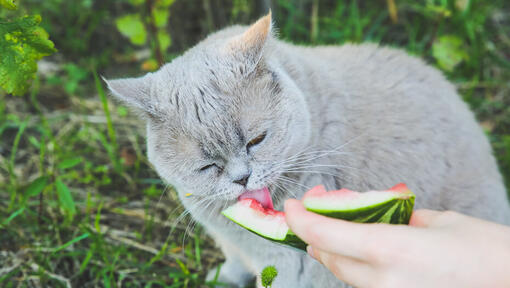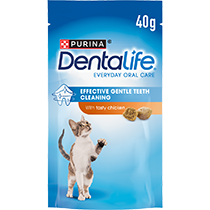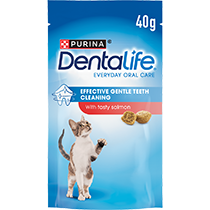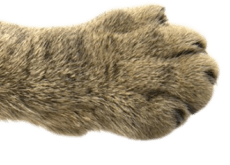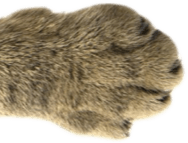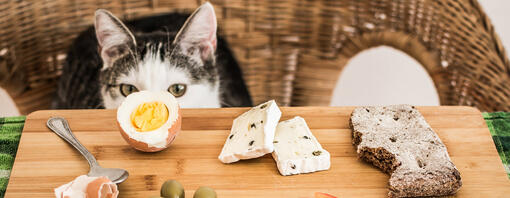
Many of us sneak our cats a bite of whatever we're eating – but have you ever asked yourself, what human foods can cats eat? While it might seem harmless to share a snack, not all human foods are safe for your feline friend. Knowing what’s OK to share – and what’s not – is essential for keeping them healthy and happy.
Cats, just like dogs, can be expert beggars at the dinner table, especially when there’s fish, meat, or dairy in sight. But even if they’re giving you those irresistible eyes, it’s important to remember that their digestive systems are different from ours.
That’s why we’ve created this simple guide to help you understand what human foods are safe for cats – and which ones are best kept off their menu.
What human foods can cats eat safely?
Generally, your cat should get everything they need from a 100% complete and balanced cat food but some human foods are safe. Cats can eat cooked meat (i.e., beef, turkey, chicken) and cooked and de-boned fish (like tuna). You should, however, avoid giving them raw meats and fish as they can make your cat sick.
Meats
Cooked, lean meats such as beef, chicken, turkey, liver and lamb without any spices or condiments are all ok for your cat to eat. However, it’s important that you take great care when serving to make sure the meat’s cooked through – never give cats raw meat – and remove all skin and bones before feeding your cat.
Fish
Cats are widely known for their love of fish and most types are actually fine for your cat to eat! They contain omega-3 fatty acids which is good for their overall health and may also be beneficial for cats with arthritis and kidney disease. As with meats, make sure the fish is properly cooked and all the bones are removed, and never give your cat raw fish.
Whole grains
Whole grains such as oats, corn, brown rice and even couscous all contain lots of protein and are all human foods your cat can eat.
Eggs
When you’re thinking about what cats can eat, it may surprise you to learn that eggs are on the menu! Cats can enjoy a small portion of cooked eggs (scrambled or boiled, without any oil or butter) and they’re full of amino acids and protein, so they make a healthy treat. Never feed your cat raw eggs, as like with humans, there’s a risk of salmonella.
Vegetables
It’s not uncommon for cats to hate vegetables, so they may simply turn their nose up when presented with one. However, if your feline enjoys an odd veggie snack, they do offer lots of vitamins, fibre and water. A few safe vegetables cats can eat are: cucumber, steamed broccoli, carrots and asparagus and peas.
Fruits
Much like with vegetables, fruits can also be a bit hit and miss with cats, with many not liking the texture or the taste. If your cat has a bit of a fruit sweet tooth, there’s actually quite a few that are safe for them to eat. Still, cats do not need fruit in their diet, so it should be considered a treat, representing no more than 10% of the whole diet.
Many contain potassium, fibre, as well as being a source of vitamins A and C and are low in calories! Bananas, blueberries, cantaloupe, watermelon (seedless), peeled apples (deseeded) and pumpkins can all be offered as a tasty snack.
Human foods to avoid feeding your cat
Where there’s lots of human foods that are safe for cats to eat, there’s also plenty out there that should be avoided. Some of the foods/ingredients that are poisonous or harmful for cats are:
- Dairy: including milk, cheese and yoghurts.
- Chocolate: dark chocolate is particularly toxic.
- Nuts: particularly macadamia nuts and walnuts.
- Grapes and raisins.
- Coffee, tea or anything with caffeine.
- Foods of the allium family: garlic, onions, chives, leeks, shallots and scallions.
- Xylitol: usually found in sweets, certain peanut butters and gum.
- Coconut milk.
- Alcohol or foods containing alcohol.
- Seeds.
- Raw meats and fish.
- Cooked bones.
- Raw, uncooked bread dough.
For more information on harmful substances and poisonous foods for cats, check out our article.
Common myths about feeding cats
Even the most well-meaning cat owners can fall for common myths about what their pets should eat. These misunderstandings can lead to poor feeding choices that may affect your cat’s health. Here are some of the most widespread myths – debunked:
Cats love milk and it’s good for them
Most adult cats are lactose intolerant. Milk, cheese, and other dairy products can cause digestive issues like diarrhoea and stomach upset.
Cats know what foods are safe to eat
Cats may try to eat harmful foods like onions, garlic, chocolate, or raisins – none of which are safe and some of which are toxic.
If it’s safe for humans, it’s safe for cats
Cats have different digestive systems and nutritional needs. Foods that are harmless to us can be dangerous for them.
Begging means they’re hungry and should be fed human food
Begging is often curiosity or habit – not hunger. Feeding table scraps can encourage picky eating and unbalanced diets.
Always consult your vet first
While sharing small amounts of certain human foods with your cat can be safe, it’s essential to consult your veterinarian before making any changes to their diet. Every cat is different – what’s harmless for one may trigger allergies or digestive issues in another, especially if they have underlying health conditions like kidney disease or diabetes.
A vet can help you understand your cat’s specific dietary needs and guide you on which treats are safe, how often they can be given, and in what portion sizes. When in doubt, always err on the side of caution and seek professional advice to ensure your feline friend stays happy and healthy.
That’s our guide to what cats can eat! Want more cat feeding tips and advice? Read our article on how to choose the best cat food for your pet, next.


